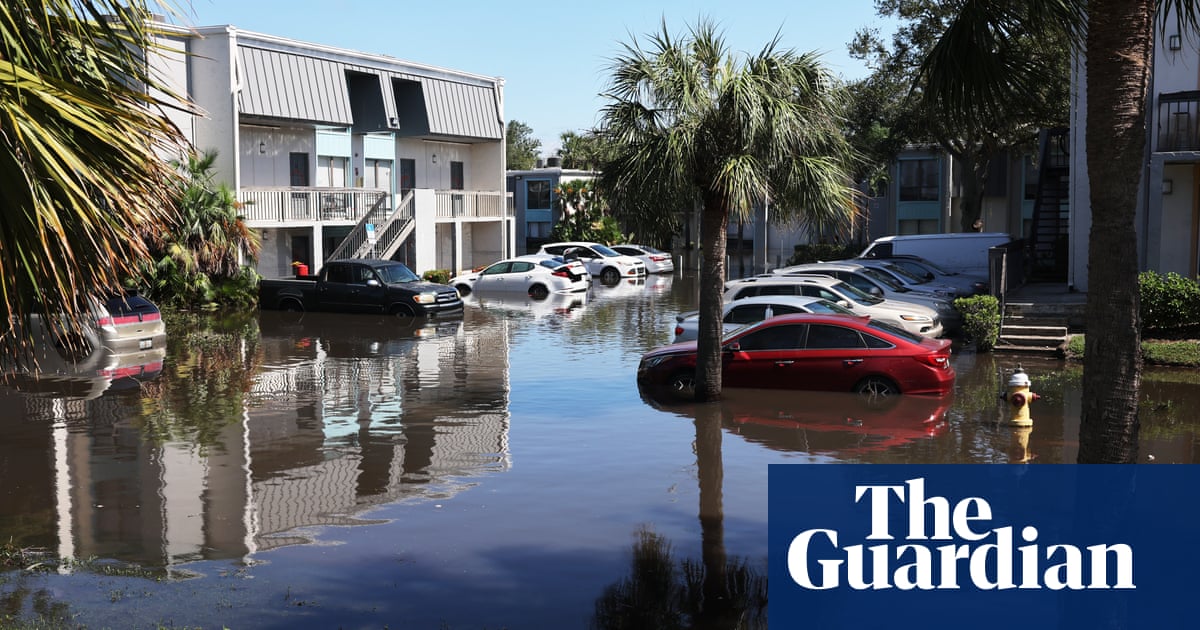Flooding is separate from typical US home insurance and many homeowners are not adequately covered
As millions of US residents begin working to file insurance claims on their homes in the aftermath of Hurricanes Helene and Milton, many could be denied, particularly if their homes were damaged by flooding.
A quirk in the US home insurance market is that flood insurance is separate from typical home insurance, which usually covers wind damage from hurricanes but not flooding. Homeowners must purchase flood insurance separately if they want their homes protected against flooding.
And many don’t. In some areas where Hurricane Helene hit the hardest, less than 1% of homes had flood insurance when the storm hit. In Buncombe county in North Carolina, home to Asheville, only 0.9% of homes had flood insurance, according to data from the Insurance Information Institute.
The number of people with flood insurance in Florida, which was hit by Hurricane Milton two weeks after parts of the state were battered by Helene, is higher than in other parts of the country. But still, the take-up is low. In Sarasota county, which took a direct hit from Milton, just 23% of residents have flood insurance.



Nah, in this case I blame the government for not having clearer regulations and a lack of informational programs.
Maybe all insurance should cover floods - but if we wanted that we’d need to regulate it… these policies were sold without flood insurance and it’s quite likely the sellers tried to aggressively upsell them to also get flood insurance.
Maybe the insurance should be government run but we need insurance - health insurance is a scam because it’s a fucking fake market, but housing insurance has a healthy market and insurers that reneg on their contract get taken to court and pursued by some truly asshole lawyers… you might argue that falsely denying a claim should come with higher penalties (and I’d agree) but half our government thinks regulations are the fucking devil.
Insurance is an inherently good idea - if we shuffled things up so that none of these people had any insurance then we’d have foreclosures and homelessness across the south right now - insurance companies are dicks but insurance is a good thing to have.
How can insurances make billions of profit if it isn’t a scam?
Isn’t it supposed to be a system to share the cost of damage, not to rip off people?
Yup, it certainly rakes in excessive profits - but the core concept of insurance isn’t a scam. It’s a good idea that gets abused in the American market.
I live in a place with essentially zero chance of major flooding, but of course there are local floods. In addition to my homeowners policy, I would have to buy three separate coverages for various type of water damage, and at what seems like ridiculous cost for my area and relative to the rest of coverage. I Believe I can’t even get one of the coverages unless I have a sump pump, but my basement is almost always dry so that makes no sense: if I get water in the basement once every decade, what are the chances of a sump pump working after sitting a decade?
Close to 100% if you follow a normal maintenance schedule. For a place where it’s rarely needed, that’s once a year. For a place where you get a lot of snow or rain, you inspect, clean, and test it every quarter. If it has sealed bearings, that takes all of 5 minutes.
I’m surprised by the number of homeowners I know who don’t routinely inspect their roofs, water heaters and HVAC, or plumbing, or at least pay someone else to do it if they aren’t willing to spend a couple hours one time making a checklist and watching a few YouTube videos to learn how to do it themselves. They don’t even glance at their roofs from the ground after a big storm to see if there was any damage (I’ve pointed out missing shingles before). It honestly takes maybe 4 hours a year to do preventative home maintenance, and keeps you from having to spend thousands of dollars doing repairs and replacements.